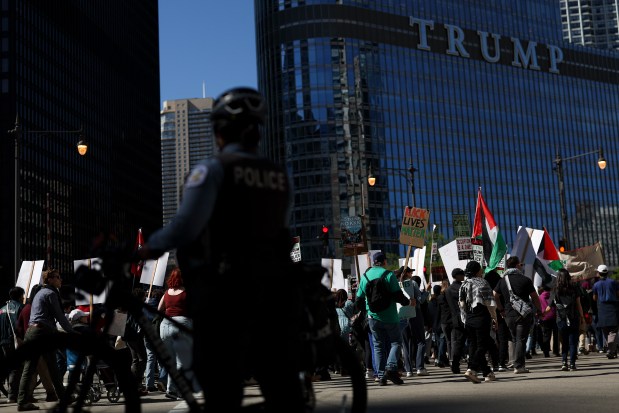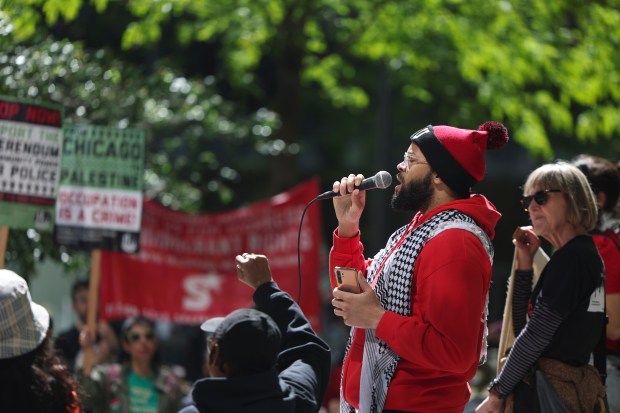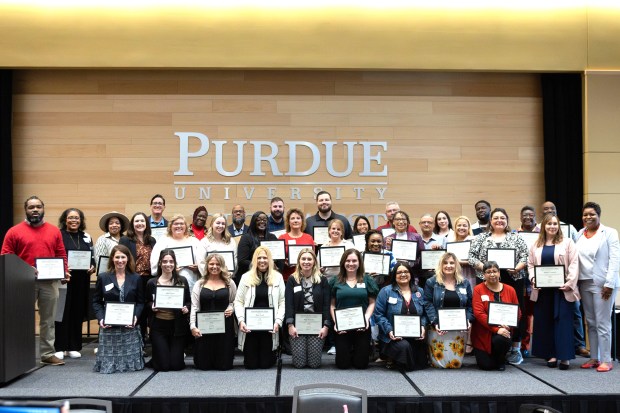On the fifth anniversary of the murder of George Floyd at the hands of Minneapolis police officer Derek Chauvin, an event that prompted a national reckoning over race and police brutality, a gathering in Chicago joined coordinated protests across the country on Sunday against President Donald Trump’s rollbacks on diversity, equity and inclusion — particularly his signing of an executive order aimed at strengthening state and local law enforcement.
“Dexter Reed. Rekia Boyd. Laquan McDonald. Adam Toledo. Reginald Clay Jr.” — as the rally began, the crowd recited the names of people fatally shot by police in Chicago. Activist and Chicago Teachers Union member Kobi Guillory, leading the chants, said Trump was “the main stumbling block to getting justice.”
On the sunny afternoon, the rally amassed a group of more than 100 people in Federal Plaza at 230 S. Dearborn St., attracting curious tourists and passersby. Speakers represented various Chicago organizations, including the U.S. Palestinian Community Network, the Chicago Torture Justice Center, GoodKids MadCity, Southsiders Organizing for Unity and Liberation and the Arab American Action Network.
On the other side of the street, over a dozen police officers observed the gathering, which eventually marched up State Street to gather across the Chicago River from Trump Tower.
Organizers said the executive order will allow policing to go unchecked by funneling federal and military resources to police departments, foregoing equity policies and eliminating federal consent decrees, or court-ordered settlements that mandate changes to address misconduct. The Illinois Attorney General has said that Chicago’s consent decree — in place since 2019 — will remain in effect.
“We have to keep fighting. In fact, Chicago is the focal point of the fight for police accountability,” said Faayani Aboma Mijana with the Chicago Alliance Against Racist and Political Repression, or CAARPR, at a news conference before the rally. “In our view, it’s people power that’s going to push it forward.”
Chicago has the most progressive police accountability ordinance in the country, according to Aboma Mijana. Passed in July 2021 after years of back-and-forth with community activists and shaped by Floyd’s murder in 2020, it included mechanisms of civilian oversight such as three council members who, under the Community Commission for Public Safety and Accountability, would serve in each of the city’s 22 police districts.
“I came here to say something loud and clear: We will not go back,” said Marquinn McDonald during the rally; he is the newest member of the 2nd Chicago Police District Council and a longtime community safety advocate. “Not now, not ever, not after the bloodshed that has been spilled, not after the tears that have soaked our soil, not after we’ve watched Black lives stolen in real time with the world watching, and still had to beg for justice.”

While activists say there are many sticking points to address in policing, they expressed hope from recent wins. The commission has worked alongside CPD to unveil the department’s policy regulating traffic stops, the first draft of which was unveiled late April.
“Let me say this to the President of the United States and to anyone who dares turn their back on justice: We see you, we hear you and we will meet you. Not with hate, but with truth; not with fear, but with fire — the fire of a people who have had enough,” McDonald said. “We demand accountability, we demand protection and we demand respect for every life across this nation.”
Reynia Jackson, a youth organizer with Englewood nonprofit GoodKids MadCity, prepared a different kind of speech than she often gives at rallies and protests. In an emotional poem, she recalled growing up with news of people of color being killed in the city — beginning when she was 6 years old, when Boyd was shot in 2012.
“I don’t have any more tears. I’m not numb to the pain. I just don’t want another brother being shot over nine times like Dexter Reed,” she said. “I don’t want reform or body cameras to be worn. I want armed strangers with immunity, patrolling my community, to be gone.”
Toward the end of the initial rally, as protesters prepared to march across Chicago’s downtown, emcee and CAARPR co-chair Jasmine Smith expressed hopes that attendees were heartened by the words of encouragement and calls to action from speakers.
“This fight, this war, does not end today,” Smith said. “Every time we show up, we show them that we can, we show them that we matter.”




